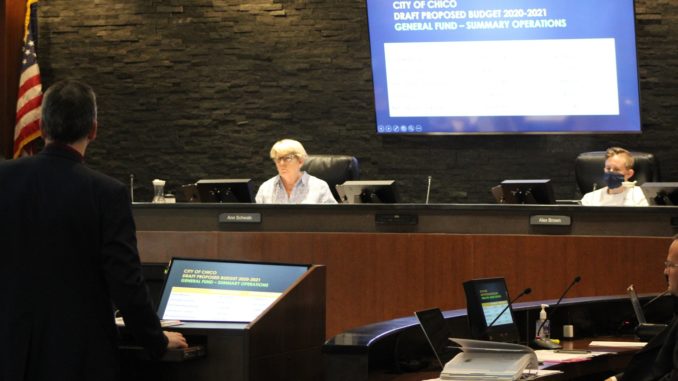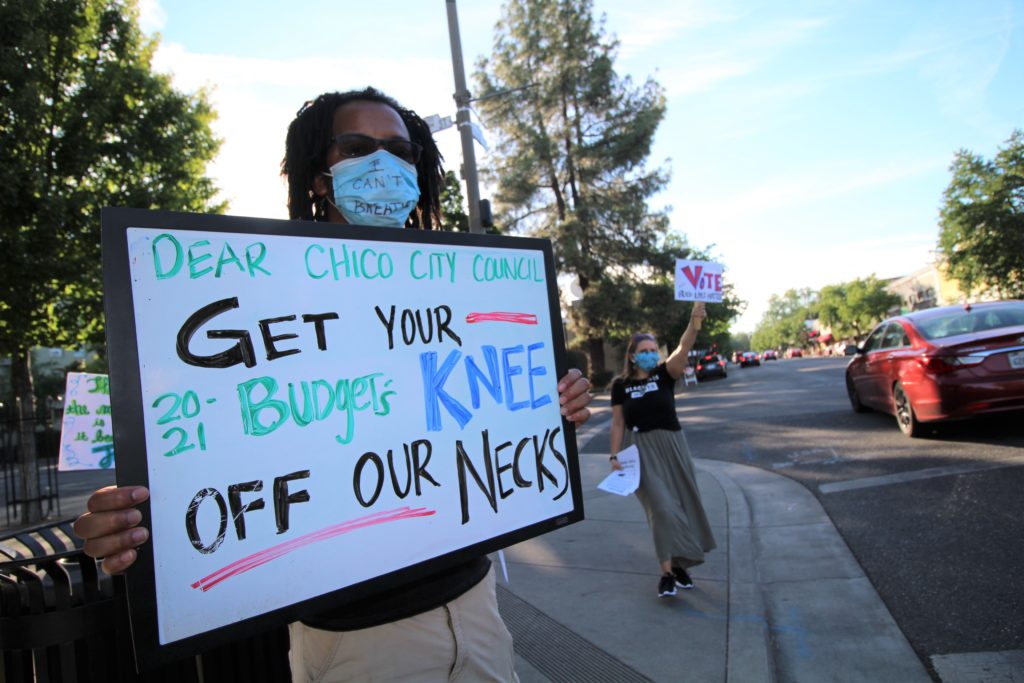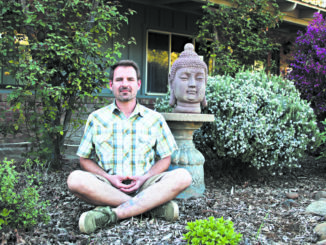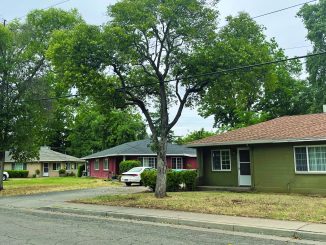
As the Chico City Council quietly assembled within the chambers on Tuesday (June 9), protesters across the street in the City Plaza cried, “No justice, no peace! No racist police!”
The panel gathered amid the city’s regular budget cycle to address the local fallout of the looming recession, but the topic provided members an opportunity to address calls for law enforcement reform based on systemic police brutality the nation over. The meeting was lengthy and continues tonight, June 10. Topics will include Mayor Ann Schwab’s proposal to agendize a discussion regarding the creation of an ad hoc committee for police policy review and reform.
As Schwab put it on social media ahead of the meeting, “The unrest in our country is unprecedented. The voices for reform are loud. This is a time to take action and assure our City’s decisions are aligned with our values.”
The ongoing protests locally and throughout the nation come in the wake of George Floyd’s killing by Minneapolis police officers on May 25. At City Plaza on Tuesday, the demonstration evolved into an emotional forum on concerns about law enforcement in Chico, including criticism of how much of the city’s budget is spent on police. The police department is allocated approximately $27.4 million, or 48.8 percent, of general fund expenditures.
Policing reform is not a new topic for Chico, with calls for policy changes and greater oversight coming most recently after the police killings of Tyler Rushing and Desmond Phillips just months apart in 2017. Both deaths spurred the creation of two advocacy groups, Concerned Citizens For Justice and Justice For Desmond Phillips, as well as lawsuits.
However, the push for such reforms has gained momentum in the wake of Floyd’s death. For example, the city has received more than 550 emails since June 1, a majority being form letters urging the council to “defund” or reallocate police funding and fire the officers involved in Phillips’ killing.
Schwab, whose long tenure on the panel includes three stints as mayor, told the CN&R she’s never seen a campaign like it.
“I had more emails on this topic than any other topic in almost 16 years, so that says a lot,” she told the CN&R.

During the budget discussion, council members brought up two significant topics related to policing. Vice Mayor Alex Brown addressed one of the main asks of advocates by requesting an analysis of how much it would cost and how long it would take to have all Chico PD officers complete 40 hours of crisis intervention and deescalation training.
Councilman Karl Ory asked to revisit the use of the city’s waste hauling franchise fees, which initially were earmarked for road repairs but got redirected to fund a special police unit.
Both of those points will be discussed further in the fall. Though the council approved the budget 6-1 (Ory abstained), the panel will be taking a deeper dive into the coffers in October. Revisiting the budget at that time is unusual but necessary due to the impacts of the COVID-19 pandemic and delayed sales tax estimates, City Manager Mark Orme said.
The council also will hear about internal ways to cut costs, as every department was tasked with coming up with 2 percent, 5 percent and 10 percent proposed cuts.
The current budget, which will return for final approval during a special meeting on June 23, already includes layoffs of 11 part-time employees and a hiring freeze for 24 full-time positions, including seven police officers, four dispatchers, two sworn park rangers, two maintenance workers and the airport manager.
Administrative Services Director Scott Dowell is projecting a $6 million drop in revenue compared with original projections for this fiscal year—this includes an estimated $600,000 reduction due to Chico State going virtual in the fall, as well as nearly $500,000 from reduced parking fees downtown.
Dowell added, however, that though revenues are anticipated to drop 8 percent this fiscal year, from approximately $59 million to $54 million, the city still expects to have a positive fund balance of $3.1 million and over $6 million in its emergency reserve fund.
“We’re trying to do the best we can to navigate through this,” Dowell said.
To avoid massive cuts, the city has researched a sales tax increase measure for the past couple years. How that could factor into the budget—and whether voters would pass it—is uncertain in the wake of the pandemic.
The city completed a survey in early 2019 that showed at least 67 percent of voters would support a general sales tax increase of 1 cent. However, the pandemic and the subsequent skyrocketing unemployment and the economic recession could impact these results, city staff noted.
The item received the most comments from the public via the city’s virtual system, Engaged Chico, with 83 people weighing in on the proposed measure. Councilwoman Kasey Reynolds asked city staff to provide a breakdown of the votes, and 88 percent said they’d oppose it. Council members also mentioned a separate citizen effort that reportedly gathered over 1,500 signatures opposing the tax hike.
City administrators made it clear that the revenue from the proposed measure would be vital to avoid more cuts. Orme said that he’s neither pro- or anti-tax, but he knows what the city is facing.
“I will have to make difficult decisions if there’s not additional revenue,” he said. “It’s just a matter of numbers.”
Ory advocated for a compromise—to draft an ordinance for a ballot measure that would ask voters to weigh in on a half-cent general sales tax measure that wouldn’t take effect until Jan. 1, 2022, and would sunset June 30, 2029. The council needs to show Chicoans that it is focused on solvency and avoiding cuts, he said.
“That should be our obligation, our duty: to bring something in front of the voters that can pass, gets us through and is the consensus of this council,” he said.
In the past, Councilman Sean Morgan and Reynolds have voiced support for a special tax measure dedicated to public safety and roads, which would require two-thirds approval from the voters to pass. The Chico Chamber of Commerce has also lobbied for a tax bump, calling for a measure that would fund “business and community priorities like increasing police staffing and improving roads,” according to its 2018 Special Report.
After a lengthy discussion, the council voted 4-3 on Ory’s proposal, with Reynolds and Councilmen Randall Stone and Morgan against. However, five affirmative votes are needed to pass a final resolution for the measure to be placed on the ballot.
“I want to set this up for success, not for failure,” Reynolds said. “So if everybody’s already telling us a general tax is not gonna go, I feel like we’re not doing the right thing.”
The council will continue conversations about such a measure at a future meeting. Tuesday’s vote, Ory noted, was effectively “meaningless.”
Tonight’s council meeting begins at 6 p.m. People can tune in online or on Comcast Channel 11. Comments can be submitted via Engaged Chico or by email to publiccomments@chicoca.gov.




Be the first to comment